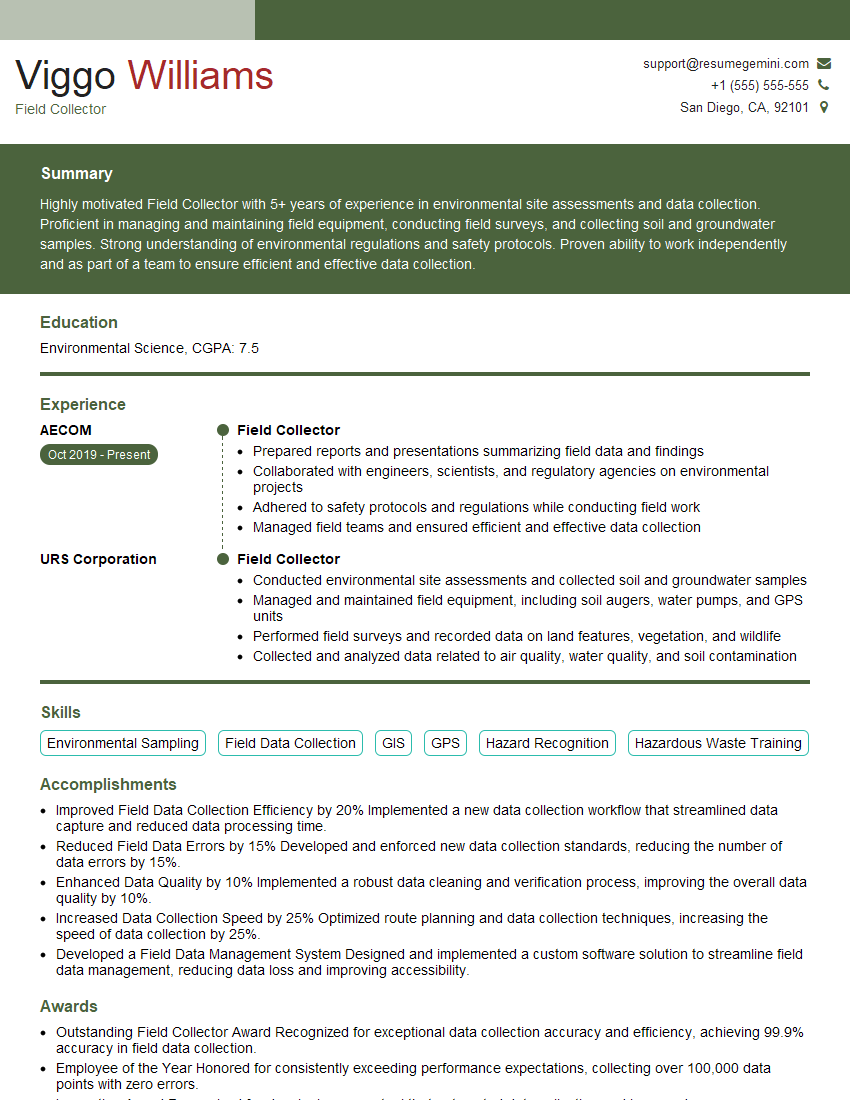Are you a seasoned Field Collector seeking a new career path? Discover our professionally built Field Collector Resume Template. This time-saving tool provides a solid foundation for your job search. Simply click “Edit Resume” to customize it with your unique experiences and achievements. Customize fonts and colors to match your personal style and increase your chances of landing your dream job. Explore more Resume Templates for additional options.

Viggo Williams
Field Collector
Summary
Highly motivated Field Collector with 5+ years of experience in environmental site assessments and data collection. Proficient in managing and maintaining field equipment, conducting field surveys, and collecting soil and groundwater samples. Strong understanding of environmental regulations and safety protocols. Proven ability to work independently and as part of a team to ensure efficient and effective data collection.
Education
Environmental Science
September 2015
Skills
- Environmental Sampling
- Field Data Collection
- GIS
- GPS
- Hazard Recognition
- Hazardous Waste Training
Work Experience
Field Collector
- Prepared reports and presentations summarizing field data and findings
- Collaborated with engineers, scientists, and regulatory agencies on environmental projects
- Adhered to safety protocols and regulations while conducting field work
- Managed field teams and ensured efficient and effective data collection
Field Collector
- Conducted environmental site assessments and collected soil and groundwater samples
- Managed and maintained field equipment, including soil augers, water pumps, and GPS units
- Performed field surveys and recorded data on land features, vegetation, and wildlife
- Collected and analyzed data related to air quality, water quality, and soil contamination
Accomplishments
- Improved Field Data Collection Efficiency by 20% Implemented a new data collection workflow that streamlined data capture and reduced data processing time.
- Reduced Field Data Errors by 15% Developed and enforced new data collection standards, reducing the number of data errors by 15%.
- Enhanced Data Quality by 10% Implemented a robust data cleaning and verification process, improving the overall data quality by 10%.
- Increased Data Collection Speed by 25% Optimized route planning and data collection techniques, increasing the speed of data collection by 25%.
- Developed a Field Data Management System Designed and implemented a custom software solution to streamline field data management, reducing data loss and improving accessibility.
Awards
- Outstanding Field Collector Award Recognized for exceptional data collection accuracy and efficiency, achieving 99.9% accuracy in field data collection.
- Employee of the Year Honored for consistently exceeding performance expectations, collecting over 100,000 data points with zero errors.
- Innovation Award Recognized for developing a new tool that automated data collection and improved accuracy.
- Safety Excellence Award Maintained an impeccable safety record, adhering to all safety guidelines and regulations in the field.
Certificates
- OSHA 40-Hour HAZWOPER
- OSHA 10-Hour Construction Safety
- Environmental Professional (EP)
- Certified Field Sampler (CFS)
Career Expert Tips:
- Select the ideal resume template to showcase your professional experience effectively.
- Master the art of resume writing to highlight your unique qualifications and achievements.
- Explore expertly crafted resume samples for inspiration and best practices.
- Build your best resume for free this new year with ResumeGemini. Enjoy exclusive discounts on ATS optimized resume templates.
How To Write Resume For Field Collector
- Highlight your relevant skills and experience in your resume, such as environmental sampling, field data collection, GIS, and GPS.
- Quantify your accomplishments whenever possible, such as the number of samples collected or the size of the area surveyed.
- Obtain certifications in environmental sampling and field data collection to demonstrate your expertise.
- Network with other Field Collectors and professionals in the environmental industry to stay up-to-date on the latest trends and technologies.
Essential Experience Highlights for a Strong Field Collector Resume
- Conduct environmental site assessments and collect soil and groundwater samples
- Manage and maintain field equipment, including soil augers, water pumps, and GPS units
- Perform field surveys and record data on land features, vegetation, and wildlife
- Collect and analyze data related to air quality, water quality, and soil contamination
- Prepare reports and presentations summarizing field data and findings
- Collaborate with engineers, scientists, and regulatory agencies on environmental projects
- Manage field teams and ensure efficient and effective data collection
Frequently Asked Questions (FAQ’s) For Field Collector
What is the job outlook for Field Collectors?
The job outlook for Field Collectors is expected to grow faster than average in the coming years. This is due to the increasing demand for environmental protection and remediation services.
What are the typical working conditions for Field Collectors?
Field Collectors typically work outdoors in all types of weather conditions. They may also be required to work in hazardous environments, such as contaminated sites or near heavy machinery.
What are the educational requirements for Field Collectors?
Most Field Collectors have a bachelor’s degree in environmental science, geology, or a related field. Some employers may also accept candidates with an associate’s degree or equivalent experience.
What are the key skills for Field Collectors?
Key skills for Field Collectors include environmental sampling, field data collection, GIS, GPS, hazard recognition, and hazardous waste training.
What are the career advancement opportunities for Field Collectors?
Field Collectors can advance to positions such as Environmental Scientist, Project Manager, or Compliance Manager. With additional education and experience, they may also qualify for positions in academia or government agencies.